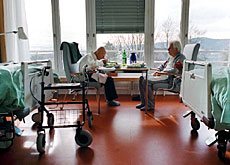
Report warns of malnutrition in Swiss hospitals

One in three patients at Geneva's University Hospital is malnourished, according to a report published this month.
Experts are calling for a nationwide action plan to make doctors and nurses more aware of the importance of ensuring patients receive a balanced diet.
The study of 1,700 patients found that one-third left hospital under-nourished, while two-thirds were setting back their recovery by not eating enough.
Malnutrition can lead to fatigue, dizziness and a decreased immune response.
Claude Pichard, coordinator of the report, told swissinfo that studies in the United States and Europe had uncovered a similar pattern of malnutrition on hospital wards.
“In France, they spend SFr10 per patient per day on food. In Switzerland we spend SFr40, so our food should be excellent. This makes [this figure we found of] one in three being malnourished all the more astonishing,” said Pichard.
Not hungry
Around 20 per cent of those surveyed in Geneva cited taste, temperature and poor choice of food as the main reasons for not eating while in hospital.
A quarter of those polled blamed their lack of appetite on the fact that they felt sick and were unable to eat.
Pichard and his team also discovered that one reason for malnutrition was the haste with which hospital food is served to and collected from patients.
“We found that they don’t have time to eat. Trays of food tend to disappear 20 minutes after they are given to patients. Older people just don’t eat that fast.”
Pichard adds that some patients reported being left alone to feed themselves even though they were unable to do so.
He saw one patient suffering from paralysis who was offered no assistance at meal times.
Improving care
“It is crucial that hospitals attend to the details when helping people to eat,” said Pichard. “Nutrition is not a side issue – it’s a vital part of health and healing.”
Those behind the recent survey also argue that more should be done to improve the quality of hospital food.
The University Hospital in Geneva is preparing to launch a pilot scheme in September which will offer patients an improved menu.
Pichard cites the example of Bern’s University Hospital, which introduced a wider selection of meals four years ago. He says food consumption has increased by 30 per cent as a result.
At a recent meeting in Bern, experts said hospital staff should be encouraged to offer advice to patients about the consequences of malnutrition.
Separate study
A separate study conducted in the German-speaking part of the country found that 18 per cent of patients were “severely malnourished” upon admittance to hospital.
The authors of the report concluded that the elderly suffered most from the effects of malnourishment.
While one in ten people aged between 45 and 64 suffers from malnutrition, this figure rises to one in four for those aged 85 and over.
“To date, none of the country’s 26 cantons have done anything to solve this problem,” said Mette Berger, president of the Swiss Society for Clinical Nutrition.
“We need to coordinate the introduction of compulsory nutrition classes for all doctors and nurses across the country.”
swissinfo, Elizabeth Meen
A study at Geneva’s University Hospital found that two-thirds of patients do not eat enough.
Experts say more needs to be done to provide patients with a balanced diet.
The president of the Swiss Society for Clinical Nutrition is calling for compulsory nutrition classes for doctors and nurses.
The effects of malnutrition can include fatigue, dental problems and depression.
According to a Council of Europe report, malnutrition is a problem in many European hospitals.
Studies have found that the medical profession does not know enough about malnutrition and its consequences.

In compliance with the JTI standards
More: SWI swissinfo.ch certified by the Journalism Trust Initiative








































You can find an overview of ongoing debates with our journalists here . Please join us!
If you want to start a conversation about a topic raised in this article or want to report factual errors, email us at english@swissinfo.ch.